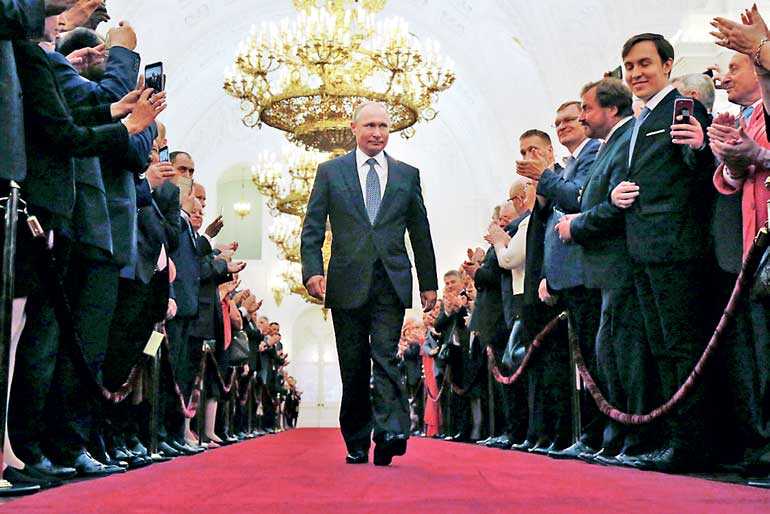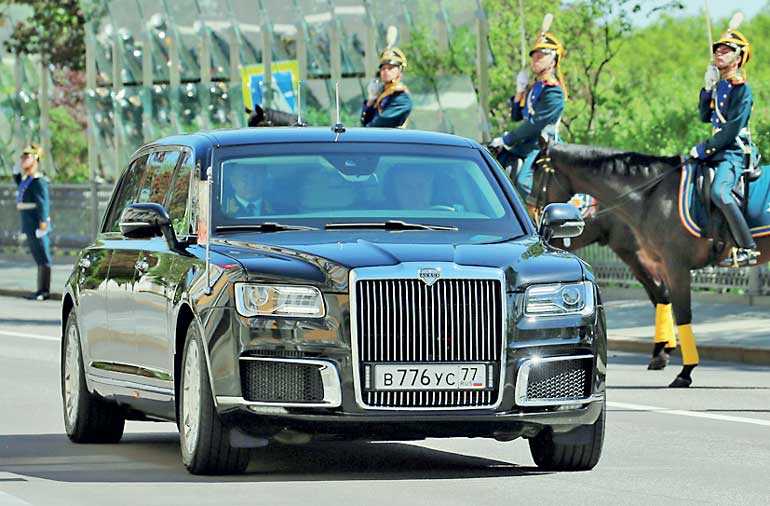Friday Feb 20, 2026
Friday Feb 20, 2026
Tuesday, 8 May 2018 00:00 - - {{hitsCtrl.values.hits}}

MOSCOW (Reuters) - Vladimir Putin was sworn in for another six years as Russian president on Monday, buoyed by popular support but weighed down too by a costly confrontation with the West, a fragile economy and uncertainty about what happens when his term ends.
Standing in the ornately-decorated Andreyevsky Hall of the Grand Kremlin Palace, with his hand on a gold-embossed copy of the constitution, Putin swore to serve the Russian people, to safeguard rights and freedoms, and protect Russian sovereignty
Putin’s inauguration for a fourth term as Russian president came two months after more than 70% of voters backed him in an election in which he had no serious challengers.
His most dangerous opponent, Alexei Navalny, was barred from running and on Saturday Navalny and hundreds of his supporters were detained by police while protesting over Putin’s new term under the slogan: “Putin is not our tsar.”
In a speech after the swearing-in ceremony, Putin said that in the next six years Russia would prove a strong, muscular player on the world stage, backed by a powerful military, while pushing hard to improve life for its citizens at home.
“Taking up this post, I feel a colossal sense of responsibility,” Putin told his audience of Russian officials and foreign dignitaries, among them former German chancellor Gerhard Schroeder.
“The object of my life and my work will be to serve the people and the fatherland,” he said.
For the short journey from his office to the inauguration ceremony, Putin travelled in a new Russian-made limousine. From now on, the limousine will replace the fleet of imported vehicles Putin uses, state television reported.
With Putin sworn in, immediate attention will turn to whom Putin will nominate as his prime minister. If he asks the current holder of the post, his loyal lieutenant Dmitry Medvedev, to stay on, that will signal continuity.
If he chooses someone new, that could presage a fresh approach on policy and will also trigger speculation that Putin is grooming a successor. Once this term ends in 2024, the constitution bars him from running again.
STANDOFF
Foreign diplomats see little prospect that Russia’s standoffs with the West that have dominated the past four years will ease during Putin’s new term.
Clashes in the past few weeks over U.S. sanctions on Russia, the conflict in Syria, and the poisoning in England of former Russian spy Sergei Skripal have left some diplomats worried that the confrontation could spiral out of control.
Opinion polls show Putin has high levels of support among Russian citizens, and Navalny has not been able to inspire a nationwide upsurge of protests.
But the Russian economy is a potential weakness for Putin.
Buffeted by lower oil prices, falls in the rouble, inflation and the impact of sanctions, average monthly wages have fallen from the equivalent of $867 in 2013 to $553 last year.
Russia’s economy, the world’s eleventh largest, returned to growth of 1.5% last year, helped by a recovery in oil prices. But that fell short of the government’s 2% target and was far from the 8.5% growth achieved in 2007, the highest level achieved during Putin’s rule.
Officials and analysts say bold policies with the best chance of reviving growth have been mired in disagreements among Putin’s policy-makers.
There is little clarity too about what happens after 2024. By then Putin will be 71. He will soon have ruled longer than Soviet Communist leader Leonid Brezhnev, whose 18-year rule from 1964 to 1982 is primarily associated with stagnation.
Likely options include Putin leaving the Kremlin but continuing to run the country from another post, or bowing out of public life and handing over to an anointed successor.
Kremlin insiders say Putin has not selected any heir apparent, and that any names being circulated are the product of speculation, not knowledge of Putin’s thinking.
The names include Igor Sechin, head of state oil firm Rosneft; Defence Minister Sergei Shoigu; Alexei Dyumin, a former Putin bodyguard who became a regional governor, and Moscow mayor Sergei Sobyanin.
Anointing a successor entails dangers for Putin as doing so too soon would risk him becoming a lame duck, allegiances shifting from him to the heir apparent and new turf wars being set off in the ruling elite.

Moscow (Reuters) - President Vladimir Putin has switched to travelling in a new Russian-made limousine, ditching the imported vehicles he has been using up to now, Russian state television reported yesterday.
The new Russian limousine had its first public outing yesterday when Putin climbed into the vehicle to travel the short distance from his office to the Kremlin hall where he was to be sworn in for another term in office.
Details of the new limousine have not been revealed, but it will become the heir to the Russian-made ZiL sedans that, for decades, transported Soviet leaders.
Putin has said that Russia should reduce its dependence on imported goods and technology, a drive that has gathered pace since Russia was hit by Western sanctions.